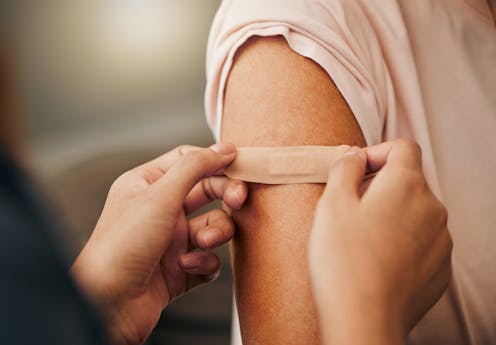When did you have your last tetanus vaccine? A booster dose may save your life
- Written by Nicholas Wood, Associate Professor, Discipline of Childhood and Adolescent Health, University of Sydney

NSW Health recently reported[1] three cases of tetanus and the tragic death of a woman in her 80s – the first tetanus fatality in the state in 30 years.
Tetanus is a rare but potentially fatal disease. Thankfully, it’s preventable – being up to date with tetanus vaccination is your best protection.
What is tetanus and how do you get it?
The bacteria that causes tetanus is called Clostridium tetani. Spores can enter your body usually following a skin wound, puncture or injury.
Tetanus cannot be transmitted from person to person.
The spores are ubiquitous, found in soil, dust and animal waste. They can persist[2] in the environment for months to years, and are remarkably hardy – they’re even resistant to boiling and a number of disinfectants.
Once in a wound, the bacteria can grow and produce a toxin. It is the toxin that acts on your nervous system to cause muscle rigidity and painful spasms.
What are the symptoms?
One classic symptom[4] of tetanus is “lockjaw”, where the muscles around your mouth go into spasms. This makes it difficult to eat and speak but patients maintain full consciousness or awareness. The muscle contractions and spasms are intensely painful and can be triggered by loud noises, physical contact or even light.
Patents with tetanus are commonly treated in an intensive care unit and require cleaning of the wound, antibiotics and injections of anti-toxin, known as human tetanus immunoglobulin, as well as a vaccine.
Read more: (At least) five reasons you should wear gardening gloves[5]
In severe cases, spasms of muscles surrounding your airways and lungs, alongside high and low blood pressure and heart rhythm abnormalities can lead to death.
Despite the best treatment, about 2-10% of patients die.
How does the vaccine work?
In Australia, tetanus is rare because of high vaccination coverage, with around 14 cases[6] reported to health authorities a year.
Tetanus can occur at any age, but is more common in older adults who have never been vaccinated or were vaccinated more than ten years ago.
The vaccine is very effective in preventing tetanus. Tetanus vaccination stimulates the production of antibodies, also known as antitoxin. This means vaccination doesn’t stop Clostridium tetani growing in contaminated wounds. Rather, it protects against the effects of the toxin.
When do we need a tetanus shot?
Tetanus vaccination has been available in Australia since 1925[8]. It’s currently on the National Immunisation Program (NIP) as an initial five-dose schedule for infants and children until five years of age, administered as a combined diphtheria-tetanus-acellular pertussis (DTPa) vaccine.
Most children[9] (97%) in Australia complete this primary immunisation schedule.
The level of antitoxin needed[10] for protection from tetanus is 0.1-0.2 international units (IU) per millilitre (mL). This level is reached[11] following a fifth dose, at age four to six years.
But by middle age, about 20%[12] of Australians have low or undetectable levels of antitoxin. This places them at risk of contracting tetanus after a wound or injury.
Read more: Health Check: are you up to date with your vaccinations?[13]
A single dose of tetanus vaccine produces protective levels of antitoxin in these people. This is why a booster dose of tetanus vaccine is recommended[14] for the following people if their last dose was more than ten years ago:
adults at 50 years of age
adults aged 65 years or over
travellers, of any age, to countries where it may be difficult to access timely health services if you sustain a tetanus-prone wound (any wound other than a clean, minor cut).
If you have a tetanus-prone wound and there is any doubt about your tetanus immunisation status, you should receive tetanus immunoglobulin as soon as possible. You should also receive a tetanus vaccine.
If you’re overseas, it could be hard and expensive to get access to both tetanus immunoglobulin and tetanus vaccine.
How do I check my vaccination status?
If you’re over 14 years of age, you can check your vaccine history:
online, by setting up a myGov account and accessing your Medicare online account through the Express Plus Medicare mobile app
by calling the Australian Immunisation Register[15] on 1800 653 809
by asking your doctor or immunisation provider to print a copy[16] of your immunisation records.
If it has been more than ten years since your last dose, ask your GP about getting a booster. It could save your life.
References
- ^ recently reported (twitter.com)
- ^ persist (www.elsevierhealth.com.au)
- ^ Sandie Clarke/Unsplash (unsplash.com)
- ^ classic symptom (www.uptodate.com)
- ^ (At least) five reasons you should wear gardening gloves (theconversation.com)
- ^ 14 cases (www1.health.gov.au)
- ^ Shutterstock (www.shutterstock.com)
- ^ 1925 (www.health.vic.gov.au)
- ^ Most children (doi.org)
- ^ level of antitoxin needed (www.who.int)
- ^ reached (pubmed.ncbi.nlm.nih.gov)
- ^ about 20% (pubmed.ncbi.nlm.nih.gov)
- ^ Health Check: are you up to date with your vaccinations? (theconversation.com)
- ^ recommended (immunisationhandbook.health.gov.au)
- ^ Australian Immunisation Register (www.servicesaustralia.gov.au)
- ^ print a copy (www.health.gov.au)

















